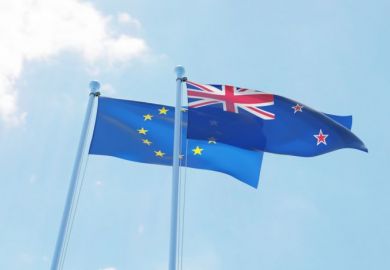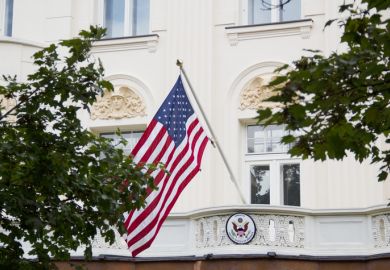Many New Zealand scientists will struggle to make head or tails of Horizon Europe, despite being given access to the funding programme for the first time, a sector leader has warned.
Temporary rules mean that since mid-February, Kiwi researchers have been able to apply to parts of the €95.5 billion (£84.7 billion) programme like colleagues from European Union member countries. This follows a yet-to-be ratified deal between the New Zealand government and the EU late last year.
The agreement has been cheered by some researchers and by the Labour government, led by prime minister Chris Hipkins since January. “Our researchers and organisations now have unprecedented access to professional networks and world-class scientific infrastructure to tackle these issues affecting us all,” said science minister Ayesha Verrall when the rules were announced.
But a sector leader has said that excitement about new funding and collaborations should be tempered by the time and understanding that will be needed to win them.
“There will be big questions about whether New Zealand researchers can engage effectively and equitably with the complex EU programme,” Troy Baisden, co-president of the New Zealand Association of Scientists, told Times Higher Education. “The matrix of clusters and missions will likely baffle many.”
New Zealand was one of the first non-European countries to “associate” to the programme, following Tunisia and Ukraine. Canada is in final negotiations, according to the European Commission, while Japan and South Korea are still in early talks.
The terms of the association deal mean that New Zealand researchers have equal access to collaborative projects in the second “pillar” of the programme, but Professor Baisden, a physical geographer at the University of Auckland, said the complexity of joining them “may initially be workable only for those with pre-existing connections to EU research”.
As a non-associated country in the predecessor EU programme, Horizon 2020, New Zealand researchers signed just 75 grants, about 0.2 per cent of the programme’s total.
Professor Baisden said the boost from association could also lead to negative side-effects because of New Zealand’s unusual funding model, which covers overhead costs such as facilities, utilities and support staff salaries as part of project grants, rather than covering them through longer-term institutional funding.
“While it may appear to make sense for NZ’s government funding body to top up the awards, such a practice will compound inequities, further undermining diversity in what appears increasingly to be a hyper-contestable research system,” he said. Low domestic success rates mean that early career and Māori researchers are “increasingly intolerant” of the grant funding model, he said, with many researchers “still reeling from the pandemic’s repeated shocks to the universities”.
A December 2022 government white paper brushed over the question of basic funding but said that joining Horizon would be a “key step” in better integrating New Zealand into the global science system. The Ministry of Business, Innovation and Enterprise held a nationwide roadshow to promote and explain Horizon participation in February.
Loveday Kempthorne, the ministry’s manager for international science partnerships, told THE the roadshow had been “well-attended”, and that while the first Horizon participants would likely be those with existing EU links, this would “quickly” change. “We do not expect any inequity to result from New Zealand’s association to Horizon Europe. Indeed our aim is to open up more avenues and opportunities – the EU is looking for diversity,” said Dr Kempthorne, adding that overhead top-ups are paid to institutes rather than researchers, and that the exact rate for Horizon was yet to be decided.
Register to continue
Why register?
- Registration is free and only takes a moment
- Once registered, you can read 3 articles a month
- Sign up for our newsletter
Subscribe
Or subscribe for unlimited access to:
- Unlimited access to news, views, insights & reviews
- Digital editions
- Digital access to THE’s university and college rankings analysis
Already registered or a current subscriber?








